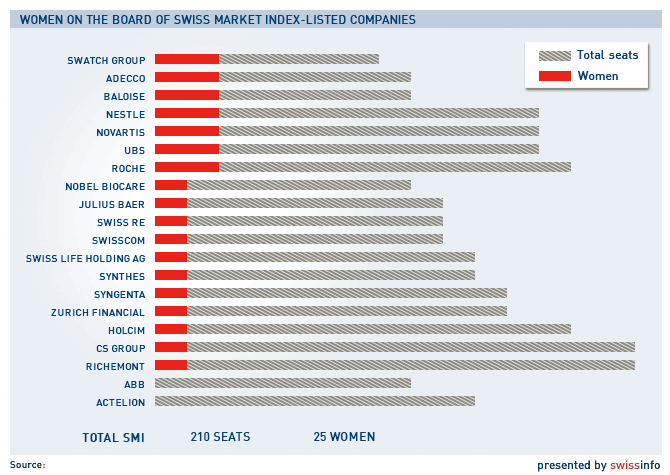Helping women break into a man’s world

None of the top 20 companies in Switzerland has a female CEO and women are largely underrepresented in boards of directors.
As Women’s Day is marked, businesswoman and networker Barbara Rigassi tells swissinfo.ch why the situation is so and how women can make it to the top.
Rigassi, an economist who sits on several boards herself, is a co-founder of the GetDiversity network. Since 2007 the Swiss organisation has been putting forward women candidates for board positions.
International Women’s Day takes place annually on March 8.
swissinfo.ch: Women are underrepresented in the upper echelons of Swiss business, despite making up more than half of those with a higher education. Why?
Barbara Rigassi: The main reason is that women’s careers do not follow such a linear path as men’s. Women start, make a change if needs be, have children, continue their further education and then somehow lose their entry point back into these “mainstream careers”.
Other women get ahead in their careers relatively quickly and then, at 40, 45 years old, decide to change direction and, for example, found their own company. They are then less visible.
swissinfo.ch: Why are the skills of well educated women not put to better use?
B.R.: This really makes no sense from an economic point of view. The skills of well educated women will, over time, be very necessary, especially in western industrialised nations, because of demographic developments.
Companies and organisations must first of all change their cultures if they want to accommodate women, and have to try new leadership models – but this needs time. It also needs the wherewithal to see this as a proper future investment and not simply as a women’s promotion programme.
swissinfo.ch: Studies have shown that mixed teams work very well and bring added value to companies. Which value?
B.R.: The studies revealed that if a group of people with the same background and experience tackled a problem, one-dimensional answers tended to be the result.
If the aim is to widen the spectrum for tackling problems and bring in different aspects, then women should be represented in these teams too. Women bring different aspects to decision-making.
swissinfo.ch: Are there not enough suitable women for leadership positions, as is often argued?
B.R.: That’s a misconception. We founded GetDiversity two years ago because we simply couldn’t believe that there were no qualified women around who were suited to leadership positions, such as board member mandates.
In the meantime we have found more than 90 excellently qualified women for our network. I challenge anyone who says that you can’t find these women.
swissinfo.ch: Do you mean that men, who are generally given the top jobs, don’t want women and play the old boy’s network card?
B.R.: It’s true that recruitment, especially on the top leadership levels, takes place in personal networks. These jobs are 93 per cent occupied by men.
They tend to look in their own networks and don’t have access to other ones. It’s perhaps not the will that’s lacking, but it depends on how the search is carried out.
swissinfo.ch: Should women become more active with their networks or should they wait for male goodwill?
B.R.: Goodwill alone is not enough. People need to be convinced that women can be effective in decision-making bodies and as a result, the quality of the work will increase.
Women must, of course, also make an effort. You simply can’t wait until you are discovered. You have to get out there, be present.
Besides, women are, fortunately, already represented in the top governing bodies. It’s up to them to bring more women into these boards.
swissinfo.ch: Do women have less confidence in themselves, making it less likely for them to reach the top?
B.R.: Women scrutinise things and generally ask more questions. They want to understand the whole picture before they make a decision. This does not mean that they have little confidence in themselves. In my view this approach is very professional and serious.
Men on the other hand say relatively quickly – yes, I can do that, I want that.
swissinfo.ch: How do women become good board members or CEOs – by following a classic male career path?
B.R.: If you look at the job specifications for board members you will notice three dimensions: the professional, the methodological and social competence. A board has to be made up in such a way that the relevant expertise is represented.
A typical male career is not required. Women have a very good chance too. But leadership experience is certainly needed and methodological experience, such as in the areas of strategy, finance and risk management.
What is very important is that you are versed in the financial domain and can make your points using figures.
There are many women who have very good leadership skills, despite not having had a straight career path. They might have gained skills in an area which is not so visible, for example in voluntary work, a non-governmental organisation or a project abroad.
swissinfo.ch: How much of a hindrance are family and children these days for women’s careers?
B.R.: Companies have in the meanwhile become much more aware and are more open about, where possible, offering part-time work.
Men also want to work part time these days when the children are small. There has been progress in this area in the past ten years. However, part-time working and top management are mutually exclusive.
swissinfo.ch: In Norway, where there have been legal quotas in place for women in the boards of state firms, the percentage of women there has increased to 44 per cent. Is this a solution?
B.R.: I am an advocate of clear goals. But this does not mean that they have to be of a political nature. I am convinced that the mixed teams issue is ultimately an economic one.
Concerning the proportion of women, companies should set and implement goals and reward or punish over the attaining of these goals. In this way we could achieve more than with a political quota.
Gaby Ochsenbein, swissinfo.ch (Translated from German by Isobel Leybold-Johnson)
The percentage of women in strategic boards of the 20 companies which make up the Swiss Market Index (SMI) rose from 9.5% to just about 12% between 2007 and 2008.
These results go towards the company average of 14.6% for the 500 largest firms worldwide.
In terms of percentage of women in company boards, the SMI do much better than the 100 largest companies in Switzerland, which only have 6.7%.
Barbara Rigassi, founder and co-manager of GetDiversity, took her doctorate in economics at St Gallen University in 1989.
She was personal advisor to the late cabinet minister Jean-Pascal Delamuraz and secretary general in a large bank.
Until 2002 she was Member of the Executive Board of the State Secretariat for Economic Affairs (Seco).
She has had her own business and been a partner with strategy consultants Brugger and Partner since 2002. She also carries out various company and foundation board duties. Rigassi is president of soliswiss, the solidarity fund for the Swiss Abroad, and of the Swiss Association of Women Entrepreneurs.
She set up GetDiversity in 2007, along with Michèle Etienne. It acts as a mediator and undertakes targeted promotion as well as offering further training for women to be accepted as board members.


In compliance with the JTI standards
More: SWI swissinfo.ch certified by the Journalism Trust Initiative






You can find an overview of ongoing debates with our journalists here. Please join us!
If you want to start a conversation about a topic raised in this article or want to report factual errors, email us at english@swissinfo.ch.